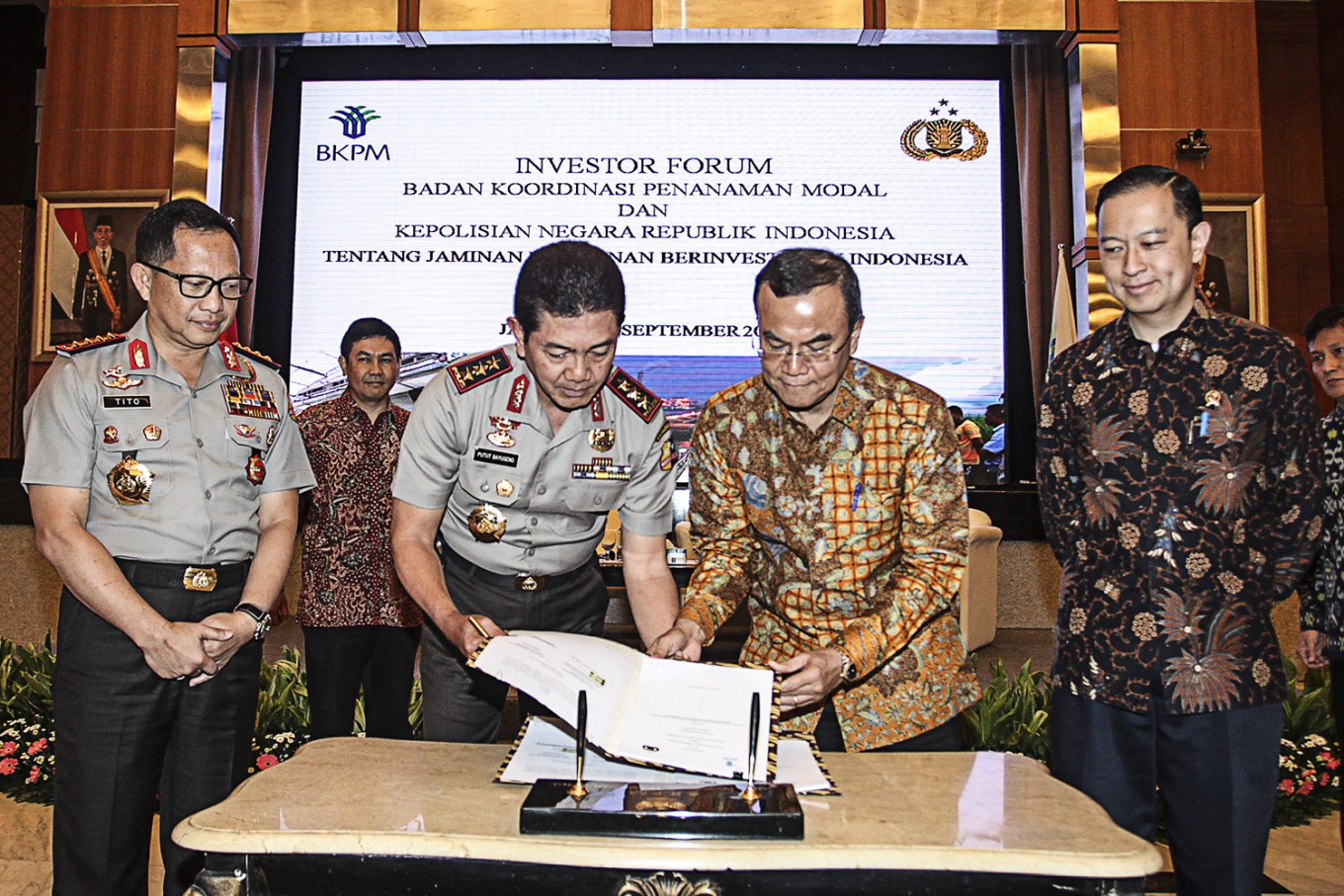Popular Reads
Top Results
Can't find what you're looking for?
View all search resultsPopular Reads
Top Results
Can't find what you're looking for?
View all search resultsGovt to ease land clearance for investors
Change text size
Gift Premium Articles
to Anyone
 Upbeat – National Police (Polri) chief Gen. Tito Karnavian (left) and Investment Coordinating Board (BKPM) head Thomas Lembong (right) witness the signing of an agreement on BKPM-Polri partnership guidelines in supporting investment activities in Indonesia at the BKPM office in Jakarta on Sept.19. (Antara/Muhammad Adimaja)
Upbeat – National Police (Polri) chief Gen. Tito Karnavian (left) and Investment Coordinating Board (BKPM) head Thomas Lembong (right) witness the signing of an agreement on BKPM-Polri partnership guidelines in supporting investment activities in Indonesia at the BKPM office in Jakarta on Sept.19. (Antara/Muhammad Adimaja)
F
aced with the obligation to meet its mid-term targets amid a cut in funding, the government has given guarantees that investors interested in financing infrastructure development projects would be given some leeway in conducting their businesses.
Agrarian and Spatial Planning Minister Sofyan Djalil said the government expected that existing and future land policies would make it easy for investors to procure land for infrastructure projects.
Sofyan said the implementation of Law No. 2/2012 on land procurement for public interest, which obliges land owners to surrender their land to the government after they receive payment, could solve the land clearance problems that usually dog infrastructure development.
“With the law, there should not be any problem anymore. The land procurement for a toll road from Jakarta to Surabaya, East Java, will finish on time,” he said on Friday, referring to sections of the extensive transJava project slated for completion in 2018.
The government earlier issued Presidential Regulation (PP) No. 148/2015, also on land procurement for public interest, which allows for a quicker dissemination of information about land procurement to the public and contains protocols for dealing with objections to land purchase proposals. The regulation stipulates that the relevant authorities must deal with an objection within three days, down from the 14 days set out in a 2012 presidential regulation.
Sofyan also said that his ministry would set up a task force to crack down on groups and individuals he identified as “land mafia” who wanted to profit from land clearance projects.
The task force would also find ways to deal with expired and fraudulent land certificates.
“This land procurement issue has really compromised legal certainty and the economy. We know that legal certainty is important for ease of investment,” he said.
Sofyan said the government was preparing a presidential regulation on bridging funds, through which toll road operators would procure land up front and be paid back by the government later, to expedite construction and provide more certainty for investors.
Bridging funds were a breakthrough introduced by the Public Works and Public Housing Ministry earlier this year, after finding that it had spent its whole land procurement budget of Rp 1.4 trillion (US$107.2 million) even as the construction of many toll roads was still underway.
The government allocated Rp 16 trillion for National Asset Management Agency (LMAN) in the revised 2016 state budget for the agency to procure land for infrastructure projects and pay back toll road operators.
So far, the operators have paid up to Rp 4.4 trillion, with the total commitment for land procurement reaching Rp 31.5 trillion.
Indonesia Toll Road Authority (BPJT) head Herry Trisaputra Zuna acknowledged that the sluggish pace of land procurement had contributed to the government’s failure to reach the target of building 136 kilometers of toll roads this year. Last year, the government completed 132 km.
“We have just finished 44 kilometers so far, but we have the construction of 1,300 kilometers of toll road going on right now,” he said.
Meanwhile, National Development Planning Board (Bappenas) head Bambang Brodjonegoro said the government planned to divert more pension funds to pay for infrastructure development, as it could contribute to more equity for toll road operators.
“Usually pension funds are targeted for the banking sector, but with the low interest rates at the moment, they need to find alternative yields. The investment for the real sector is very promising, like the trans-Java [project],” he said.
President Joko “Jokowi” Widodo’s administration has named infrastructure development as one of its priority programs.
The quality of Indonesia’s infrastructure still lags behind that of many other countries, according to a ranking by the World Economic Forum. The country’s railway infrastructure is ranked in 43rd place, ports in 82nd and airports in 66th.
By 2019, the government has planned to build a total of 1,000 km of new toll roads, 49 new dams and 5,000 km of railway, among other things.
However, based on Bappenas data, infrastructure development in the country until 2019 will require Rp 4.7 quadrillion, while the government budget would only cover about 40 percent of the total funding.
University of Indonesia economist Fithra Faisal said law enforcement was crucial to ensure the ease of investment.
“Sometimes the government does not commit to its own regulations, or just creates new regulations,” he said, adding that even with the deregulation effort, investors continued to be in “wait and see” mode.









